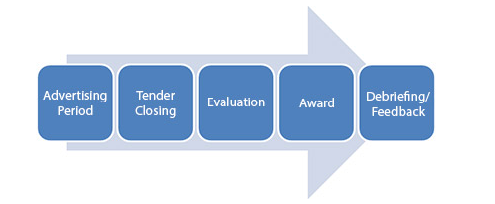Doing business with government. Where to begin?
Government contracts offer businesses a lucrative opportunity, but there’s a lot to learn about how to win a bid through the tender process. For many small to medium sized businesses this process is perceived as being too complex and cumbersome. Unfortunately, this ”overwhelm” is a major deterrent for businesses to navigate, and they either try and fail (and never try again), or they never try at all.
Am I too small to tender?
A lot of businesses falsely assume that they are too small to do business with government. This is no longer true. In fact, governments now recognise that small businesses fuel the economy, and new initiatives to encourage participation are now in place in many countries. These initiatives include:
- Committing to sourcing a percentage of all procurement contracts from small to medium enterprises (SMEs)
- Exemptions to go to public tender for lower value contracts, allowing direct engagement (providing value for money can be demonstrated)
- Smaller contract sizes or work packages to reduce project risk
- Shorter payment terms and on-time payment policies.
Smaller businesses can often compete on better margins and this puts them in an advantageous position to achieve the best value for money to government.
Where to find government business opportunities for your business
Every year, the government advertises thousands of business opportunities for the supply of goods and services through open tender. These opportunities are advertised through website portals which can be freely accessed directly from the government website, or if you want to save time you can also use a third party vendor that scrapes public advertisement data from multiple sites and makes it available for a subscription fee. Bidhive makes this data freely available for Australian and UK tenders, along with aggregated buyer, supplier and contract award data which can be useful for market intelligence.
You can find opportunities that closely match your business via these portals. They will contain all the documentation you need to read and complete, along with the timeline of dates for the competition (such as deadline for submission of questions, due date, evaluation period, decision timing and contract period).
What are the steps involved in the tender process?
Seasoned bidders know it is wise to invest in making sure you win one good tender rather than spread yourself thin on tendering for many opportunities and losing them all. Taking the time to understand the customer and building a relationship wtih them before the tender request is issued will give you a competitive advantage because once the tender request is issued, tender rules preclude you from meeting or speaking one on one with the customer.
Once a tender has been issued, the time between the advertising period and the tender closing date is often very tight (for example 3 to 4 weeks).

Doing business with government: Steps in a typical open tender process
Behind the scenes, however, there are many steps you need to follow as a bidder that can streamline your internal processes while improving your win rate. The more time spent on pre-bid activities has been proven to increase the chances of success compared to waiting until the opportunity has been advertised, leaving little time to gather quality information, write the responses and ensuring everything is compliant while meeting the non-negotiable deadline.
Most mature bidding organisations have a pre-defined set of activities and steps they perform before they bid such as:
- Monitoring the market for trends and similar opportunities
- Documenting contract expiry dates ahead of a re-bid
- Researching buyer behaviour and creating buyer profiles
- Preparing boilerplate content and setting up a centralised bid content library
- Developing a bid/no bid decision criteria to minimise bias
- Monitoring resource capacity and task assignments
- Analysing win/loss outcomes.
How do you know if your company is ready to do business with government?
To become a tender-ready business, you firstly need to qualify as a potential provider. As a baseline, you’ll need to have a legal trading entity and provide a registration number, insurance and possibly banking details. There may also be exclusion criteria so you need to read all of the documentation first to ensure you can meet the mandatory requirements.
Probity, fairness and value for money
Bids submitted through the tender process are evaluated based on probity, fairness and value for money. Probity in the procurement process includes:
Meeting the technical and quality (non-price) criteria
Technical and quality-related criteria are defined based on the specifications provided in the solicitation documents. In the case of procurement of goods, technical criteria might consist of the minimum functional or technical requirements that must be met. In the case of services, the criteria might include qualifications and experience required, provider availability, physical presence, specific technical approach, past performance on similar contracts, and so on.
Technical criteria must be defined clearly and in such a way that proposals can be evaluated for their adherence (or failure to adhere) to the requirements. In the case of a tender for services, technical and other non-price criteria can be scored with points to determine the offer with the highest value for money to the buyer.
Meeting the financial (price) criteria
The financial criteria in a tender establishes the basis on which offers will be reviewed. It must be clear to suppliers what factors must be included in their offer (such as travel costs, maintenance or licenses) and the extent to which these must be provided in detail.
The ratio between technical and financial factors may differ from one tender to another. The right balance between the different evaluations criteria must be established before the tender is issued, and that balance must be stated expressly in the tender documents (for example 30% weighted on price versus 70% weighted on non-price criteria).
Taking the step
Submitting a bid is only one part of the larger puzzle when trying to win government contracts. You need to have a solid understanding of the process, what agencies are looking for and be able to answer any questions that come your way. If you’re not confident in your company’s ability to do all of this, consider partnering with a bid consultancy or start with sub-contracting to organisations that have experience bidding on government contracts. They can help you to learn the process and mature your approach to win more bids, in less time.


